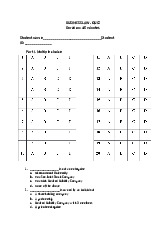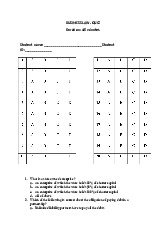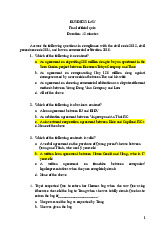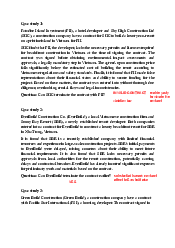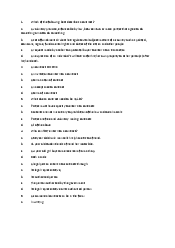




Preview text:
1.
What is the legal term for an agreement between two or more par es that creates legal
obliga ons under Vietnamese law? a) Contract. b) Pact. c) Accord. d) Treaty. 2.
Under Vietnamese law, a contract is considered valid when:
a) It is in wri ng and signed by both par es.
b) It is verbally agreed upon by both par es.
c) It meets the requirements of the law and shows the inten on to create legal obliga ons.
d) It is approved by a notary public. 3.
Which of the following is NOT an essen al element of a valid contract under Vietnamese law? a) O er and acceptance. b) Lawful objects. c) Competent par es. d) Witnesses. 4.
Can a person with limited legal capacity enter into a contract in Vietnam?
a) Yes, with the assistance or consent of a legal representa ve.
b) No, a person with limited legal capacity cannot enter into a contract.
c) Yes, as long as the contract is approved by a public notary.
d) Yes, but only if the contract involves small monetary amounts. 5.
In Vietnam, a contract concluded under force or fraud is: a) Void. b) Valid and enforceable.
c) Voidable at the innocent party's discre on.
d) Invalid only if challenged in court. 6.
Which term is used to describe a contract that has no legal e ect from the beginning? a) Void contract. b) Valid contract. c) Unilateral contract. d) Implied contract. 7.
Which of the following situa ons may result in a contract being void under Vietnamese law?
a) One of the par es lacks legal capacity.
b) The contract involves illegal ac vi es.
c) The contract was entered into under duress or fraud. d) All of the above. 8.
What happens if a contract violates a mandatory provision of Vietnamese law? a) The contract is void.
b) The contract is voidable at the discre on of the party a ected by the violation.
c) The contract remains valid unless challenged in court.
d) The contract is valid and enforceable. 9.
What is the general legal age of contractual capacity in Vietnam? a) 16 years old. b) 18 years old. c) 21 years old. d) 25 years old. 10.
According to Vietnamese law, an o er can be revoked by the o eror:
a) Any me before acceptance is communicated.
b) Only if the o eree has not yet received the o er.
c) Once the o er is communicated to the o eree.
d) A er acceptance is communicated. 11.
Which of the following is NOT a valid method of accep ng an o er under Vietnamese law? a) Express acceptance.
b) Implied acceptance through conduct. c) Silence as acceptance.
d) Acceptance by a third party. 12.
In Vietnam, when does acceptance of an o er become e ec ve?
a) When the acceptance is communicated to the o eror.
b) When the acceptance is signed by both par es.
c) When the acceptance is sent by email.
d) When the acceptance is dra ed in wri ng. 13.
Can an acceptance modify the terms of the original o er under Vietnamese law?
a) Yes, as long as the modi ca ons are minor.
b) Yes, but only with the approval of the o eror.
c) No, any modi ca ons would be considered a counter-o er.
d) No, acceptance must be an exact mirror image of the o er. 14.
Which of the following scenarios would result in the termina on of an o er under Vietnamese law?
a) The o eror's death before acceptance.
b) The o eror's withdrawal of the o er.
c) The o eree's rejec on of the o er. d) All of the above. 15.
Can an o er be accepted by silence under Vietnamese law?
a) Yes, if the o eree does not respond within a reasonable me.
b) Yes, if the o er expressly states that silence cons tutes acceptance.
c) No, acceptance must be communicated in some form.
d) No, silence is never considered acceptance. 16.
Which of the following is NOT a recognized ground for contract termina on under Vietnamese law? a) Mutual agreement. b) Breach of contract. c) Force majeure.
d) Change in market condi ons. 17.
How can a contract be terminated under Vietnamese law?
a) By mutual agreement of the par es. b) By opera on of law. c) By breach of contract. d) All o he above. 18.
Under Vietnamese law, what does the term "force majeure" refer to in a contract? a) Breach of contract
b) Unforeseen circumstances beyond the par es' control c) Invalid contract d) Late payment 19.
What remedies are available to a party in case of contract breach under Vietnamese law? a) Termina on of the contract b) Damages c) Speci c performance d) All of the above 20.
What is the legal consequence of a contract being declared void under Vietnamese law?
a) The contract is enforceable b) The contract is voidable c) The contract is terminated d) The contract is modi ed 21.
Which party has the right to terminate a contract if the other party fails to perform its obliga ons? a) Buyer b) Seller c) Both par es
d) Only the court can terminate a contract 22.
In Vietnam, a sale contract can be concluded through which of the following methods? a) Oral agreement. b) Wri en agreement. c) Electronic communica on. d) All of the above.
